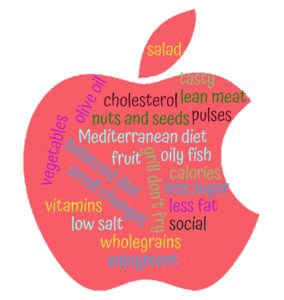Cardiac rehabilitation focuses on the principle of self- management, helping you to look at ways to actively manage and change some of your health behaviours. It does take a little bit of effort and planning but can benefit your long term health and quality of life. We have provided some general information and suggestions below that you can adopt to help improve your heart health and general well-being.
Relaxation:

Relaxation has been proven to help people recover from a heart attack. It has many benefits for health and can help you to reduce stress, cope with problems, increase your feelings of being in control and lower your blood pressure and heart rate. It can also help to reduce tension, reduce fears and anxieties, and help you to get a good refreshing sleep.
It takes most people about 12-16 weeks to get the full benefit of relaxation, at first it may seem that very little is happening – but stick with it! To start with, you should practice for 20 minutes twice a day. The more you practice the more natural it will become. Relaxation is a core part of the Heart Manual programme with the audio available in different formats including an app for those enrolled on the programme. For those who do not have access to this app, here is a link you may find useful:
Additionally, the app ‘Feeling Good: positive mind-set’ can be downloaded via the app store on mobile devices for free. Although many of the relaxation audios need to be purchased within the app, it offers a free Guided Body Relaxation that you may find useful.
Exercise and Activity:
Cardiac rehabilitation can help you to get back to doing the activities and exercise you used to do, or help you increase your activity in the future.

We have provided some useful links below to programmes and plans that you may wish to use to set long term activity goals after you have completed your cardiac rehabilitation programme. What you choose to do will depend on your current level of activity and fitness. We do not advocate any one in particular. It is better to start with manageable goals and build-up gradually. If you are unsure about how to safely increase your activity speak to your cardiac rehabilitation team or your GP.
Reduce your time sitting down:

We often spend more time sitting down (sedentary) than we think. Keeping active throughout the day, no matter what your age or physical abilities are, is important. For older adults that do not routinely engage in physical activity it is particularly important and provides benefits to general health and the ability to carry out daily activities. Here are a few hints and tips to reduce the time you spend being sedentary. Break up periods of inactivity (such as sitting watching TV or working at a computer) by:
- Getting up and walking about, making a hot drink, or going out for a walk
- Do some household jobs such as washing the dishes, hoovering, cleaning, light gardening etc. over the course of the day
- Set an alarm so you can get up and get a break from long periods at a computer screen or stand up whilst working (you can do this even if you don’t have a variable height desk)
- Take proper breaks and go for a walk at break or lunch time if you are working
Why not give them a try!
Healthy Diet:

We all know how hard it can be to stay on track and eat healthily, but making even small changes to your diet can provide long term health benefits. It can be confusing when there are so many diets out there, so here are a few simple changes you can make to your diet to help your heart:
- Eat less fat:
- Especially animal fat such as butter, cheese and full fat milk. You can replace this with low-fat options and plant based products such as olive oils etc.
- Trim the fat from any meat you eat and grill rather than fry
- Reduce the amount of red meat and processed food you eat such as pies, pastries and processed meats.
- Eat plenty of fruit and vegetables- aim for 5 portions in total each day.
- Eat plenty of fibre- choose wholemeal varieties of foods such as rice, bread, and pasta. Beans, peas, broccoli and pulses are also high in fibre.
- Avoid sugary and fatty snacks such as biscuits and cakes- opt for fruit or nuts as a snack alternative
- Try to eat two portions of fish each week, including one portion of oily fish. Oily fish is high in omega 3 fatty acids and can be found in salmon, trout, tuna, mackerel and sardines.
- Don’t add salt to your food at the table
This seems like a long list so do it gradually and try one change at a time. Start with one that you think you can achieve easily. See the NHS eat well guide here. Please note if you have special dietary requirements or conditions such as diabetes then it may be helpful to discuss any changes planned with your GP or clinical specialist. Additional support and advice from a dietician may be helpful.
Health Checks
An important aspect of self-management is to look after your general health which includes:
Taking up the offer of immunisations such as flu, Covid-19, pneumococcal vaccines
Making sure you engage in screening programmes for e.g. cervical, breast, prostate, bowel cancer screening, as appropriate
Taking up any invitation for general health checks offered from your GP Practice e.g. blood pressure, weight etc.
Speak to your GP if you develop or have a change in symptoms that are causing you concern.
Smoking
Smoking increases your risk of many conditions including heart attack, cancer and stroke to name a few. Stopping smoking can be hard but there is help available. There are many products that can help you stop smoking e.g. nicotine patches etc. so speak to your local community pharmacist or GP Practice for advice and support. There is more information here on smoking and includes helpful hints on how to stop.

Spend Time with Others
Communication and socialising with others is vital to maintain a healthy lifestyle and can help your overall wellbeing. Whether it is talking about something that is bothering you or just meeting for a social chat. Talking to someone can help to relieve stress, improve your mood and can provide you with vital support. Feelings of loneliness and isolation can affect your health and so it is important to engage with others. Ways that you can do this include:
Get involved in local community activities
Volunteer
Join an exercise class
Support groups can also help you to stay connected and provide you with additional support and understanding which can benefit your wellbeing. Have a look at the BHF and CHSS support groups, which you may wish to join.
The information provided on these pages is general and should not be seen, or used, as a formal programme for cardiac rehabilitation.
If you are given the opportunity to take up a formal cardiac rehabilitation programme you should do so. Advice and support from cardiac rehabilitation practitioners can help you build confidence, manage and understand your condition, and achieve your goals for a lifelong positive change through a tailored programme specific to your needs and condition.














